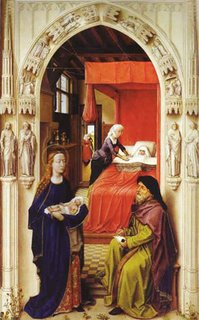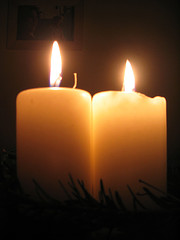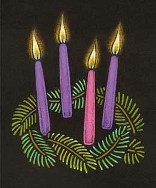
Friends, here is a sermon in the first person; I will preach this morning in a little rural church.
“God Has Remembered”
Luke 1:5-25, 68-79
Advent II C
December 10, 2006
To speak… to be able to speak after nine long months of silence… this must be what the newborn feels, when it can finally fill its lungs with air and let out a howl! The joy of it! To speak! My tongue is slow and stumbles after its long rest. But the power of God’s Spirit will fill my mouth, and I will give the words to you.
A baby is born. My son is born, John… the most natural thing in the world, a thing that happens to countless young women in Jerusalem every day. Why such wonder? Why such joy? But, you see, we are old, Elizabeth and I … not as old as Abraham and Sarah, but long past our time for bearing children. A year ago you could have asked anyone in Jerusalem and they would have told you: Zechariah and Elizabeth are righteous, they are blameless before the Lord. But if you had looked into their eyes, delved into their hearts, they might have told you another story, too shameful to say out loud. Their eyes would have said, “We don’t know. We don’t know if they are blameless and righteous. If they were, wouldn’t the Lord Most High have blessed them with a child?” I saw it daily, beneath the courtesy they showed me as a priest of the temple, stepping aside when I walked by in my ornate robes. Elizabeth saw it in the whispers behind the veils at the marketplace. They were not sure. God had not blessed us, Elizabeth the daughter of priests, and I a priest, God had not blessed us with a child, and they wondered. They doubted.
We wondered. We doubted. What had we done? What had we not done? What sin had so defaced our souls that God Most High should withhold this simple, ordinary blessing from us? What crime lay deep in our hearts—hers, mine—that the Lord should not allow us to participate in perpetuating the covenant with Israel? For a time we even began to doubt one another… a poison entered our home, and we questioned each other like village elders cross-examining witnesses of murder. But then… we prayed. And in answer to our prayer, God spoke a quiet word in each of our hearts, saying, “Remember Abraham and Sarah. Remember Isaac and Rebecca. Remember Elkanah and Hannah. Remember, remember.” And so the poison left our home and our hearts, and we loved and consoled one another with God’s reminder to us: remember.
But still the years passed, and our hair turned grey and our faces became lined. And the years passed for me in another particular and painful way as well. I am a priest of the temple, and I came to believe that God withheld blessing from my work as from my home. There are many, many of us—all descendants of the priests of David. I am descended from his priest, Abijah. Here is how we go about our work. We are divided into twenty-four groups, and each group is responsible for worship in the temple for two weeks of the year. During those two weeks, a list is made, a list of those of us who have never before entered the sanctuary. Lots are cast to see who will be given the honor. Can you imagine? There are so many of us… we can expect to do this just once in a lifetime, to have the honor to enter into the holy of holies, the very presence of the Lord. And I, at my great age, had never been chosen. God had not blessed us with a child. And God had not blessed me with the honor of serving in the temple sanctuary.
But hear my story: let me tell you how it happened. It was just over nine months ago…and my group, the sons of Abijah, was scheduled to serve in the Lord’s temple. I rose one morning, and kissed my wife, and we blessed one another at the doorway of my home, and I walked through the city and approached the temple. I climbed the steps, as I have done for more than thirty years, now with the knees and back of an old man. And my name went on the list as it had more than thirty times before. I had given up hoping. All I sought was to receive the disappointment with dignity, and to not reveal my bitterness to anyone.
We stood at the steps outside the sanctuary, dozens of my brother priests and I, surrounded by the people murmuring their prayers, prayers they wanted us to bring into God’s presence, as part of our holy offering. The murmuring quieted as the high priest read just two names: first, carrier of the firepan: Josiah, a man of 42 years, a distant kinsman. And then: carrier of the incense: Zechariah. I saw a ripple go through the crowd. The lot had fallen to me! Zechariah! The oldest among my brothers who had never served. I saw the faces of friends, men with whom I had served all these years. One or two were moved to tears on my behalf. I who had stopped hoping to see the promise of the Lord fulfilled. I was to offer the incense in the holy of holies.
I took the bowl, filled with incense, into my trembling hands, and waited as the other one took his implement. His job was to prepare the altar for my offering. So even at this moment when my life’s work was to reach its pinnacle, I had to wait. I had to wait patiently while Josiah entered the holy of holies to clear away the ashes into the silver firepan. Wait while he then emptied them into a gold firepan. Wait, while he prostrated himself before the altar, lying full on the floor of the holy of holies, in the presence of God Most High. I could not begrudge him this time. Finally, he came out and it was my turn to go in. I parted the veil, and entered the holy space. To my left, as I entered, was the gold lamp stand, flowers and almond blossoms fashioned out of gold, holding the flaming oil by which I was able to see. To my right was the golden table on which twelve loaves of presence were always kept, bread serving as a reminder of the twelve tribes of my people dwelling forever in the sight of God. In front of me was the golden altar of incense.
I have been a priest my whole life, and before I was a priest, I was being trained to be a priest. But no one knows how he will react when in the presence of God, in this holiest place. Almost unbidden, words of David came to my mouth:
“O Lord, I call to you: come to me quickly; hear my voice when I cry to you.
Let my prayer be set forth in your sight as incense, the lifting up of my hands as the evening sacrifice…” (Psalm 141)
In God’s presence, the deepest prayer of my heart came forth like the wail of a child… that God should remember God’s covenant with us, with Elizabeth and Zechariah, God’s humble and willing servants.
The moment the words of the psalm left my lips I saw that I was not alone. My first thought was fear of embarrassment—fear that I, perhaps a confused old man, had entered the holy of holies too soon, while Josiah still ministered with the firepan. But this was no brother priest I saw before me. This was like nothing I had ever seen. Soon my fear grew and grew, and I trembled in terror. What was this I saw? Just to the right of the altar of incense was a brightness like nothing I had ever witnessed. Was it the Lord God? But no, if I looked at the brightness I could see a face. Even Moses himself had not been permitted to see the face of God, so I knew this must be a messenger. But the beauty and brightness of this messenger! Every sunrise and sunset, ever fire in every stove, every flame of sacrifice, or bonfire to burn brush… this was more beautiful than all of them together, and brighter than the sun in the height of the sky at midday.
The creature spoke: “Do not be afraid, Zechariah…” They always say this, messengers from God Most High, Do not be afraid! “…For your prayer has been heard. Your wife Elizabeth will bear you a son, and you will name him John.” I nearly dropped the bowl of incense, and I remembered Sarah at the opening to the tent, hearing the prophecy of the visitors and laughing aloud. I was careful not to laugh, but I was suddenly filled with giddiness. God had heard my prayer? God had heard my prayer!
It was hard to follow all that the messenger said next. A few words remain… “joy, gladness,” “filled with the Holy Spirit,” “He will make ready a people prepared for the Lord…” Finally I could contain my giddiness no more. I started to laugh, and said “But how…?”
I don’t remember what the messenger said next, but the terrible brightness dimmed and darkened, and I fell to my knees, for I knew he was angry. I looked down, shaking, afraid to gaze upon the bright beauty any longer. And then, I could see that all that remained was the flickering of the lamp stand. It took a long time to stand up. I gathered the incense together, and approached the altar. Lighting it, I prayed again, “Let my prayer be set forth in your sight as incense…” Then I lay face down on the floor, until I could feel the coolness of the earth enter my skin, and settle in my bones. At last, after a very long time I stood.
The crowds outside were waiting for me. I had taken even longer than Josiah. It was customary to give a blessing, and I opened my mouth to give the assurance that I had conveyed the prayers of the people to God Most High. But nothing came forth from my mouth. I stood there for a long time, opening and closing my mouth, and I could see fear spreading among the gathered crowd. What did it mean? Was it a bad oracle? Finally, I turned and went into the temple. I offered the incense for the rest of my time of service without incident, another 13 days. Then I returned home to my wife.
Elizabeth knew what to expect when she saw me. She had heard, through the gossips at the market and the visitors who came to see what her reaction would be to this latest misfortune. When I walked into my house she stood ready to receive me into her arms. She whispered into my ear, “You don’t need to speak. I remember.”
One week ago the midwife placed into my arms my red-faced, squalling firstborn child, and this morning I returned to the Temple, still carrying him, still a discontented bundle of noise. When they asked his name, Elizabeth told them “John.” There was hesitation. Would I agree? Would I accept this name, my own child, and not named after me? I was given a tablet, and I wrote these words: “His name is John.” And at that moment, God opened my mouth.
Have I told you yet what my name means? Zechariah: “God has remembered.”
Blessed be the Lord God of Israel, for he has looked favorably on his people and redeemed them. God has remembered.
He has raised up a mighty savior for us in the house of his servant David, as he spoke through the mouth of his holy prophets from of old, that we would be saved from our enemies and from the hand of all who hate us. God has remembered.
Thus he has shown the mercy promised to our ancestors, and has remembered his holy covenant, the oath that he swore to our ancestor Abraham: God has remembered.
To grant us that we, being rescued from the hands of our enemies, might serve him without fear, in holiness and righteousness before him all our days: God has remembered.
And you, child, will be called the prophet of the Most High; for you will go before the Lord to prepare his ways, to give knowledge of salvation to his people by the forgiveness of their sins. God has remembered.
By the tender mercy of our God, the dawn from on high will break upon us, to give light to those who sit in darkness and in the shadow of death, to guide our feet into the way of peace. God has remembered.The promises from long ago, God has remembered.
Your pain and mine, God has remembered. And so must we. Amen.


























